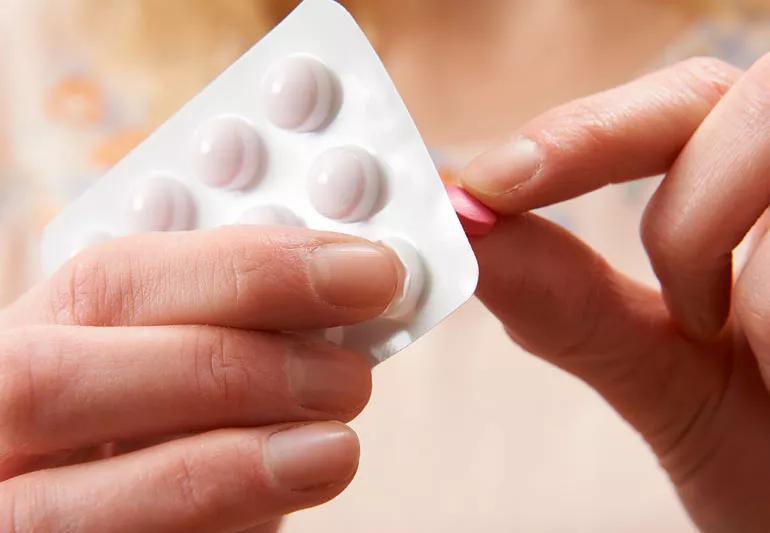Know the options — and potential risks

Image content: This image is available to view online.
View image online (https://assets.clevelandclinic.org/transform/239aa16a-8e9c-434a-955a-803927d24384/ibuprofen-Pill-Hands-174878628-770x533-1_jpg)
Close up of ibuprofen being punched from a blister pill pack.
Have you ever added a wedding, beach vacation or sporting event to your calendar — only to realize your period is likely to show up at the same time?
Advertisement
Cleveland Clinic is a non-profit academic medical center. Advertising on our site helps support our mission. We do not endorse non-Cleveland Clinic products or services. Policy
You may have heard high doses of ibuprofen or other anti-inflammatory drugs can stop or delay your period for a special event. Do they work, and are they safe?
“While anti-inflammatories like ibuprofen may reduce or even delay your periods, there are no guarantees,” says Ob/Gyn Rebecca Russell, MD. “And the medicines will likely affect each person differently.”
Here, she answers common questions about which options are best, and when:
While ibuprofen is a strong pain reliever, it would take a high dose to affect your period. “Stopping a period would require a higher dose than any over-the-counter bottle recommends: about 800 milligrams of ibuprofen, every six hours, or 500 milligrams of naproxen, three times a day,” says Russell. “This would have to be done very regularly.”
“Anti-inflammatories like ibuprofen and naproxen reduce the production of prostaglandins,” says Russell. Prostaglandins are chemicals that trigger the uterus to contract and shed the endometrium (uterine lining) each month. However, Russell points out that taking ibuprofen will only delay your period for no more than a day or two.
Taking pain relievers or anti-inflammatories of any kind should be done with care. Russell suggests taking alternative steps in delaying a period if you need to. “I have not seen this proposed in any medical journals, and I would not recommend anyone try this on their own,” she says.
Advertisement
Russell instead recommends asking your doctor to prescribe the hormones progesterone or estrogen (or a combination of the two) which can help delay a period for a couple of days or even weeks, depending on your needs.
“Other options include birth control medications that can suppress periods for a couple of months,” she says.
A non-hormonal medicine (an anti-prostaglandin called tranexamic acid) is also an option. However, it only decreases blood flow by about 50%.
It’s important to know the certain risks and possible symptoms due to high doses of ibuprofen. Some severe symptoms could include:
However, most young, healthy women should have no significant problems from taking high doses once in a while. But before you try a new medication or higher-than-prescribed dose, make a point to reach out to your doctor about what works best for you as well as the potential side effects.
You may also be wondering, what if you have a heavy flow? Is it possible to use ibuprofen as a way to manage it?
“We do recommend high-dose anti-inflammatories like ibuprofen to slow down heavy periods,” says Russell. “They have some potential to help in the short term.” But Russell advises they will only slow your period flow by about 10% to 20%.
Ibuprofen can also be used to help with any period pain you may be experiencing.
“While we recommend ibuprofen for a lot for women with significant cramping, most of them don’t notice major changes in their flow,” she adds.
If you’re looking to delay your period in time for a special event, Russell says it depends on how far in advance you consult your doctor.
If you contact your doctor a couple of months ahead of an event, birth control will likely be your best chance to reliably delay your period, says Russell.
If you ask for help a week or two in advance, then a high dose of progesterone will be best to delay your period for a week or so.
But remember: Everybody is different. Some women can skip periods for a whole year, and have no bleeding on certain treatments, while others will only delay their period for two to three weeks, and then will start to experience breakthrough bleeding, Russell advises.
“For some, we won’t ever be able to completely stop your period, but we can slow or delay them,” says Russell.
Advertisement

Delivered every Tuesday!
Sign up for our Health Essentials emails for expert guidance on nutrition, fitness, sleep, skin care and more
It's a letter about the news!
Learn more about our editorial process.
Advertisement
Don’t be so quick to pop that over-the-counter painkiller
Although it can be alarming, it’s normal to experience blood clots during menstruation
Reasons for spotting can include menopause, uterine fibroids, PCOS and birth control
Hormonal changes are the likely culprits behind the aches and fatigue before your period
Irregularities in cycle length and flow aren’t a cause for concern
Hormone fluctuations impact oil and sebum production, creating painful, tender pimples
Typically, you can keep your appointment, let your gynecologist know and let your worries go
It depends on your menstrual flow, and a little trial and error
Type 2 diabetes isn’t inevitable with these dietary changes
Applying a hot or cold compress can help with pain
Pump up your iron intake with foods like tuna, tofu and turkey